
Humans are killing sharks at an unprecedented rate. An estimated 100 million sharks are killed per year; intentionally for their meat or fins, as bycatch of commercial fishing, or by marine pollution among many other causes. This is causing shark populations to drastically decline in numbers with many species teetering on the brink of extinction.
Sharks play an integral part in the ocean’s ecosystem. As apex predators, they keep the marine food chain in balance. If sharks were to disappear from the world’s oceans, the environmental consequences would be catastrophic. Without sharks, there will be a decline in the populations of other ocean species, a growth of suffocating algae blooms that produce toxins and destroy coral reefs, and an increase the carbon loading of the atmosphere which would speed the rate of global warming.
Many people are understandably concerned and outraged by this and want to do more to help to stop these killings, but don’t know how.
One of the most common questions that I get asked is “what can I do to help sharks?”
A lot of people are under the impression that unless you live near an ocean or have some sort of big online presence or social influence, that you can’t make a difference in the fight to protect sharks, but this couldn’t be further from the truth.
There are a ton of things that you can do on an individual level that can help protect sharks.
To celebrate Shark Week and all the amazing work that’s being done by conservationists around the globe, I want to share with you a handful of things that you can start doing TODAY that will help protect sharks.
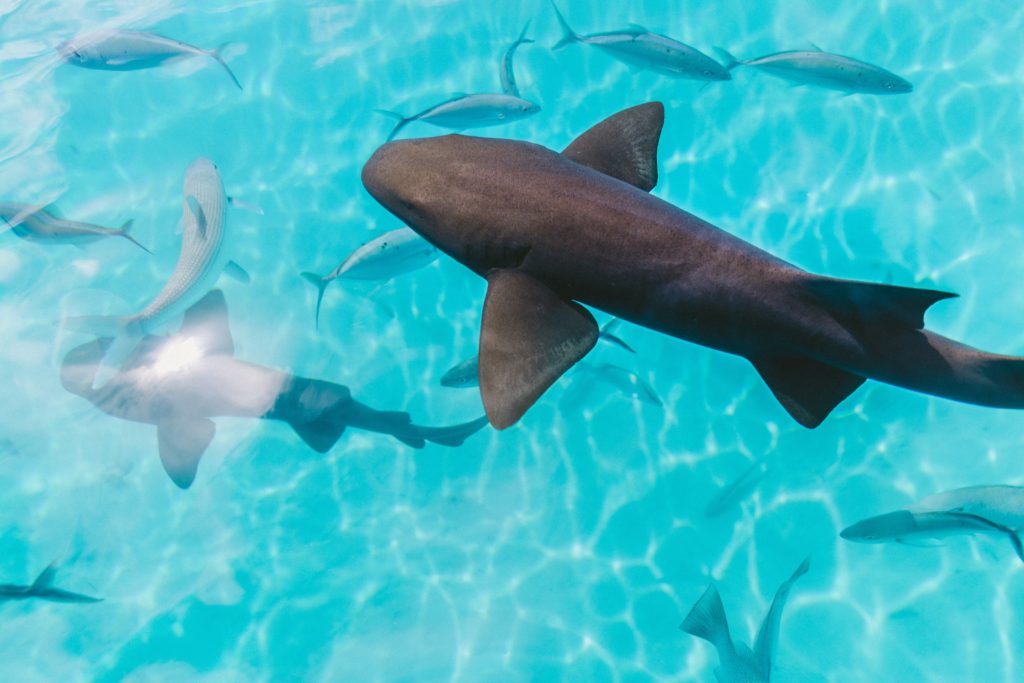 Don’t Use Shark Products
Don’t Use Shark Products
Shark meat is the obvious one here; don’t buy shark fin soup or other shark meats when you’re purchasing seafood or dining out. However, there are actually a lot of less obvious products on the market that also contain shark. A lot of times oils, beauty products, and health products contain shark cartilage.
The easiest way to ensure that the products you’re purchasing do not contain shark products is to carefully read the ingredients label. Be aware that shark meat products in the supermarket are often given different names, such as flake or rock salmon. If you’re not sure what a particular label is, give it a quick Google to avoid accidentally eating an endangered species of shark.
By boycotting shark products, you will help to reduce market demand, creating a shift in the market until it’s no longer profitable for fisherman and companies to kill sharks.
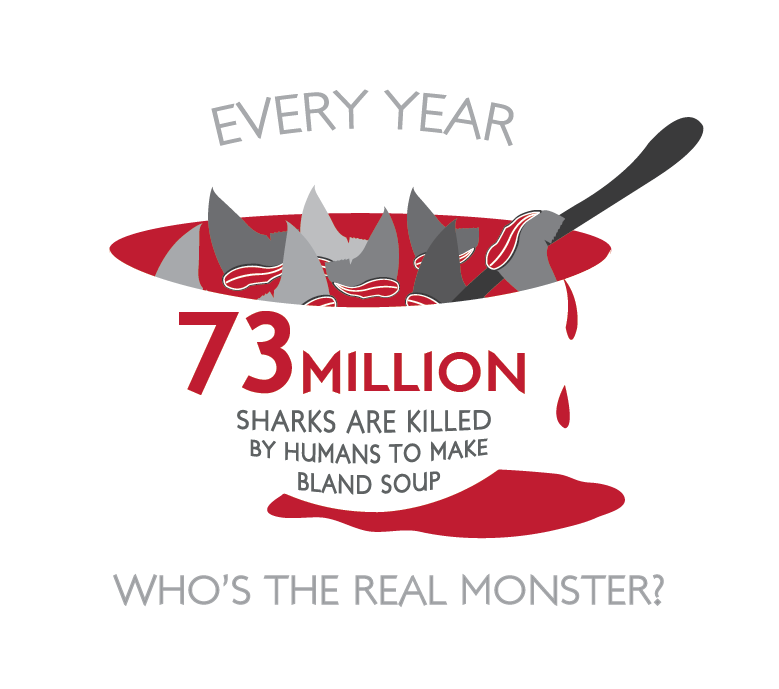 Boycott Places that Serve Shark Products
Boycott Places that Serve Shark Products
Your favourite seafood restaurant still serving shark fin soup on the menu? Stop going there.
Better yet, have a conversation with the manager; ask them why they’re serving shark fin soup and try to be understanding as you explain the environmental consequences of exploiting shark populations. If the manager is unresponsive to your request to take shark fin soup off the menu, come back with an army and cause a scene. I’m talking peaceful protest style. Grab a group of fellow shark lovers and stand outside the restaurant with big signs – let everyone know that this particular spot is supporting the murder of sharks and educate passerby’s about why it’s an issue.
***Seriously, I’m all for protesting, but please, please, please be smart about it. If you plan to protest in the name of shark conservation or any other cause, NEVER get physical and DO NOT curse at people. Keep it respectful and people will be much more willing to listen to you.
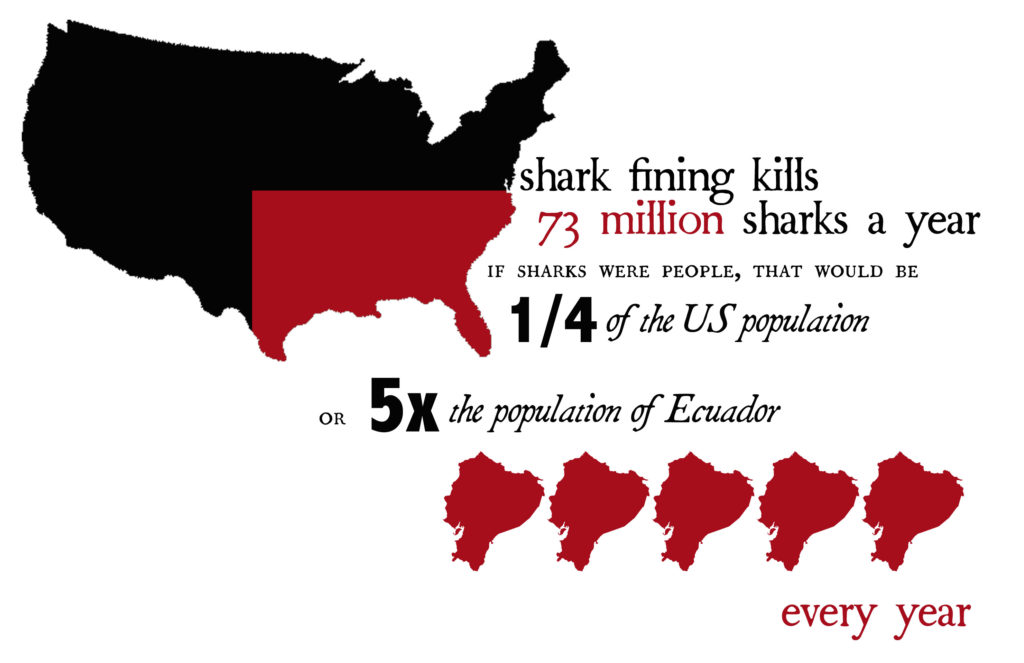 Stay Informed
Stay Informed
The most important thing that you can do to help sharks is to learn about them! Knowing about the different types of sharks, their habitats, behaviors, and the threats that they face will make you better equipped to protect them. By educating yourself on the issues you can find effective ways to help and help to spread the word to others to encourage them to get involved as well.
[embedyt] https://www.youtube.com/watch?v=3UqkgRGPqsk[/embedyt]
Reduce Your Waste
One of the biggest threats to our oceans and sharks is pollution. With plastic pollution accumulating at startling rates and the five massive gyres housing tons of garbage, sharks can easily mistake our waste for food or become entangled in it.
Even if sharks aren’t the ones eating plastic, plastic inevitably is eaten by other species of fish that sharks do it, which can lead to a toxic bioaccumulation of chemicals leading to illness and death. Try to reduce your waste by refraining from using single-use plastic products and recycling as often as possible.
See my post HERE for more tips on how to reduce your plastic waste!
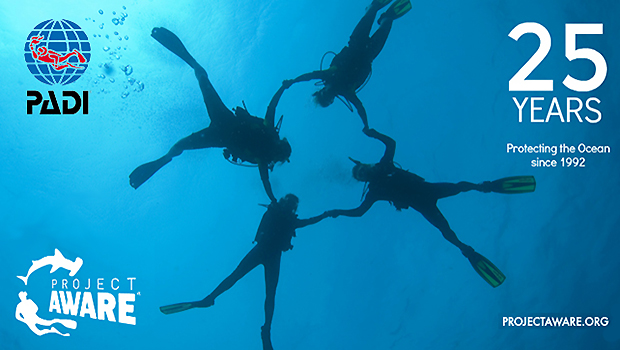 Donate to Shark Conservation Organizations
Donate to Shark Conservation Organizations
There are hundreds of amazing organizations all around the world that work tirelessly on a wide variety of shark conservation efforts. These organizations fight to educate people, stop illegal fishing and shark finning, and support laws that protect marine protected areas. If you have some extra cash, donating to these groups helps to fund their efforts and ensure they’re able to continue on in their fight to protect sharks.
Purchasing products from organizations that donate proceeds to shark conservation is another great way to help sharks. For example, Cape Clasp donates 15% of their profits to a variety of different shark and ocean conservation organizations and I donate 10% of the profits from my shop to the World Wild Life Fund Legacy Fund for Rob Stewart.
Some of my other favourite organizations that you can donate to are the Nakawe Project, Project AWARE, and 4Ocean.
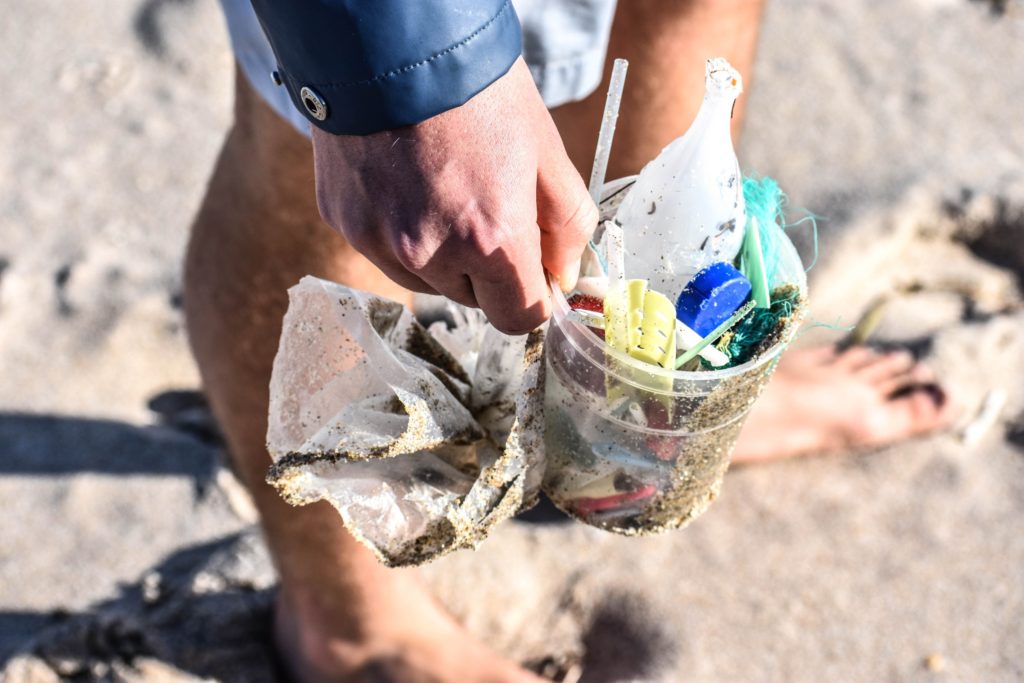 Volunteer
Volunteer
If you can’t donate money, donate your time! It’s just as, if not more important than monetary donations to these groups. After all, there is strength in numbers. Whether you’re volunteering for something simple like a local beach cleanup or tabling at a local convention, or doing something big like joining a group on a week-long shark tagging expedition, your efforts will not go unnoticed and they are needed now more than ever.
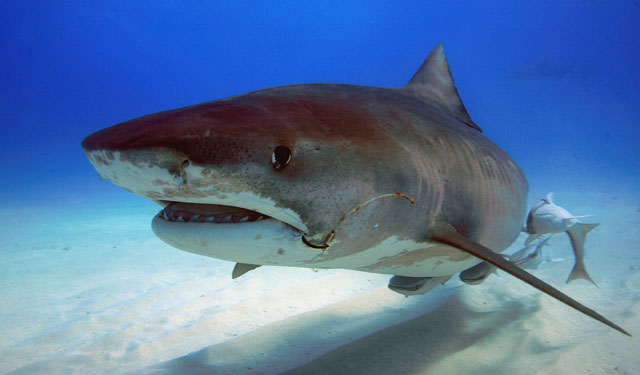 Report it When You See It
Report it When You See It
If you do happen to be at a beach or on the water one day and notice some fishy (no pun intended) behavior taking place, be sure to report it to the proper authorities. And if you’re unsure, it’s always better to say something than say nothing at all. If you think someone may be participating in illegal fishing activities or shark abuse, gather as much information as you can and report it to the local authorities. Additionally, if you happen to be in the water and spot a shark that may be injured, report that as well. Experts in the field may be able to locate the shark again and attend to the injury.
 Make Sustainable Seafood Choices
Make Sustainable Seafood Choices
Commercial fishing has been negatively impacting our oceans for years and is jeopardizing many different species of aquatic life, including sharks. Overfishing has a few different consequences for sharks: it reduces the populations of their food sources, especially sharks that rely on bony fish as their primary food source. Most notably though, sharks are killed as bycatch when they accidentally become entangled in these massive, industrial-scale fishing nets.
It’s important that if you are going to eat seafood, you are getting it from sustainable sources. In order to do that, make sure that you’re always reading the packaging on your products. One of the easiest things to look for is an eco-label from Ocean Wise or the Marine Stewardship Council. These two organizations distribute certification labels to certain seafood products that are deemed sustainable based on a variety of criteria including the species of fish, where it was caught, and how it was caught.
If your product doesn’t have an eco-label, one of the first things you can look for is how it was caught. If the seafood was caught by a longline or bottom trawler, the chances are that it’s unsustainable as it probably resulted in a lot of by-catch. You can also look at the species of fish and determine if it’s an endangered species or not. Of course, no one is expecting you to know the population status of every fish in the ocean; there is a great app called “Seafood Watch” by Monterey Bay Aquarium that allows you to quickly look up a seafood product and provides information regarding its sustainability.
 Use Your Voice
Use Your Voice
Unfortunately, sharks can’t speak for themselves. I’m sure if they could they would be saying a lot of awful things to humans thanks to the way they’ve been treated, but since they can’t it’s up to us to speak for them.
Talk to your friends and family; educate them on the issues.
Leverage social media! Facebook, Instagram, Twitter; these are all powerful tools to help spread awareness about sharks and shark conservation. Something as simple as sharing an article about shark finning with your network can make a huge difference.
Reach out to your local schools and community centers, these are great places to encourage people to get involved in a cause.
Write to your politicians. Write a letter to your local representatives to tell them that shark conservation is important to you and explain why you think there should be more legislation protecting them.
[embedyt] https://www.youtube.com/watch?v=_89gbZhauXg[/embedyt]
Go Diving with Sharks
Get up close and personal with sharks and see firsthand why I love them! I promise that after one dive with these incredible creatures you will fall in love with them too and be even more inspired to lead efforts to protect them. Shark diving also directly helps to protect local shark species because governments are much more likely to set up conservation zones when sharks bring in tourism revenue to an area.
Check out some of my shark diving posts HERE.



